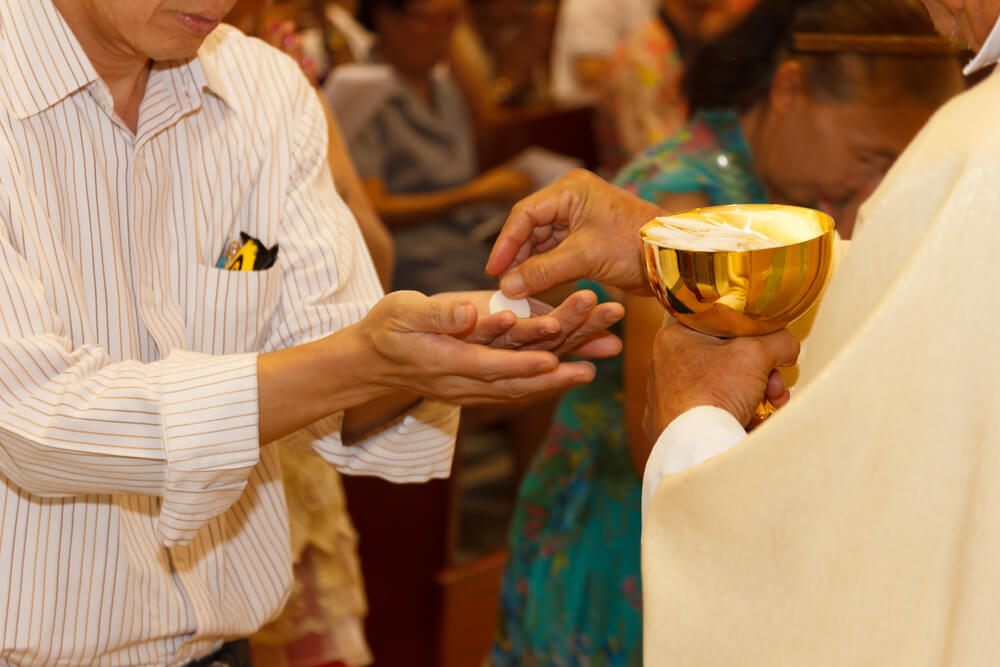Holy Communion is the most personal, intimate way that we can connect with Our Lord. Catholics believe that the Eucharist is the Body, Blood, Soul, and Divinity of Jesus Christ, and receiving the Eucharist is creating a one-flesh union with Jesus as members of His Church. It is, most importantly, a relational experience.
But many people have questions about who can receive Holy Communion. Can a fallen-away Catholic receive when they go to Mass with their parents on Christmas? Can a Lutheran receive Communion, since that is a part of their liturgy as well? What about those who are Eastern Orthodox, who believe the same as Catholics when it comes to the Eucharist but are not in communion with the Roman Catholic Church?
Recently on Go Ask Your Father™, Monsignor Stuart Swetland gave an outline of who can receive Holy Communion in the Catholic Church. He began by explaining what receiving Holy Communion means, perhaps pointing out the obvious, when he said, “Our Communion means we’re in communion with the Lord.”
Some may perceive that the Catholic Church has many rules surrounding the Eucharist as a means of excluding people. But Msgr. Swetland explained that it is not a matter of exclusion, but rather one of honesty when it comes to receiving the Eucharist at Mass.
He said, “You have to be in full communion with the Catholic Church to receive Communion. That should be very clear. One needs to be in full communion and needs to be living in accordance with that full communion – in a word, being in a state of grace – to fruitfully receive Communion.”
“To receive Communion when you’re not in communion with the Catholic Church, under normal circumstances, would be a lie that you would tell with your body. Because you would say you were in communion by receiving Communion when you’re not in communion.”
This distinction between exclusion and honesty is especially important when it comes to bishops telling Catholics in the public square that they should not present themselves for Communion. Some see it as a means of punishment, when rather it is a matter of the bishops telling those who persist in dissenting from Church teaching to act with integrity.
Msgr. Swetland drew this connection, saying, “This is why the bishops have, from time to time, said to prominent public persons who have openly broken communion with the Church by denying central Church teachings on certain moral or dogmatic issues that they ought not to receive Communion. Because by their action they have chosen and they’ve made it public that they aren’t in communion with the Church.”
Establishing that Holy Communion is an act of assent that one is in communion with the Catholic Church, this raises the question of other ecclesial communities (such as the Eastern Orthodox Church and other communities) who have valid sacraments and the same beliefs about the Eucharist, but who are not part of the Roman Catholic Church. If one goes to an Eastern Orthodox church or an Anglican church on Sunday (or for a wedding or funeral) they would be advised to not receive Communion there without proper dispensation from their bishop.
Acknowledging this reality, Msgr. Swetland said, “There are those who are in communion with the Lord who aren’t in the visible structure of the Church. I’ll be the first to admit that. But [receiving the Eucharist] also says I’m in communion with the ecclesial community in which I’m receiving Communion. So that’s why Catholics don’t receive Communion in non-Catholic churches.”
Keeping in mind that we want to avoid telling lies through our actions, but also that the Eucharist is about relationship, Msgr. Swetland acknowledged that there are exceptions to who is allowed to receive Holy Communion.
“Now, there are exceptions,” he said. “First of all, the community exception at the danger of death. Since receiving viaticum is a requirement, in the sense that we want to receive that food for the journey. Catholics are to receive viaticum, if at all possible, as they move from this life to the next. They move, if you will, from communion sacramentally only to communion in the life to come.”
“We can receive, as viaticum, from someone who has the valid Eucharist that we’re not in full communion with,” he continued. “An Eastern Orthodox priest or an Anglican priest who has himself been validly ordained, they have a valid Eucharist, they can give us viaticum when in danger of death. And likewise, a Catholic priest can minister viaticum to an Anglican or an Eastern Orthodox in that time of death, or someone else who is not in full communion with the Catholic Church.”
And there are other exceptions that apply not only to life or death situations, but are still rare. Msgr. Swetland said, “A bishop can give permission for a non-Catholic who believes in the Real Presence, who is from an ecclesial community that has valid sacraments, to receive Communion on special occasions. But it’s a one-off kind of thing, it’s not a standard that you can receive anytime. It’s like at a wedding between a Catholic and an Orthodox, and it’s being held in the Catholic Church.”
“You know, the Eastern Orthodox are very close, they believe what we believe about the Eucharist,” he pointed out. “While we have slightly different marital theologies, we believe marriage to be a sacrament, etc. So a bishop can, in petition by that non-Catholic, can grant that permission on that special occasion.”
So while there are exceptions that can be granted by a bishop or by end-of-life circumstances, in general only those who are in communion with the Catholic Church and in a state of grace may fruitfully receive Communion in the Catholic Church.
“The norm is that we try to be as fully honest as we can be,” Msgr. Swetland said. “And on normal occasions, to receive Communion says that I’m in communion with Christ, and I’m in communion with this ecclesial community in which I am celebrating.”
Listen to the full conversation below:
Go Ask Your Father airs weekdays at 1:00 p.m. Eastern/10:00 a.m. Pacific on Relevant Radio® and the Relevant Radio App.


